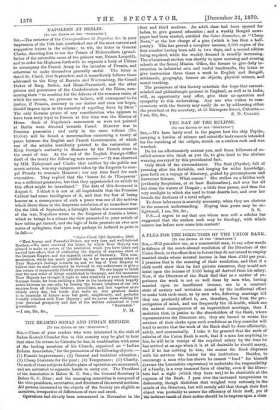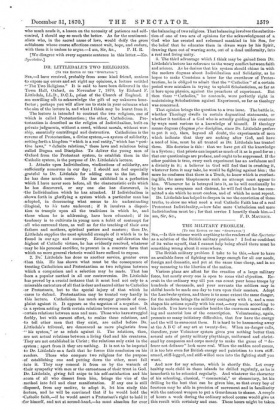A PJAA FOR THE DIRECTORS OF THE UNION BANK..
[TO THE EDITOR OF THE 'SPECTATOR."] SIR,—Will you allow me, as a commercial man, to say a few words in defence of the much-abused resolution of the Directors of the - Union Bank, to the effect that in future they do not intend to employ married clerks whose secured income is less than £150 per year. I presume that is the meaning of their resolution, and that if a. clerk could show that he had private resources, they would not. insist upon the income of /150 being all derived from his salary.. Now, if the Directors of the Bank find that as a matter of ex- perience the work is not so well done by men who, having: married upon an insufficient income, are in a constant- state of anxiety and irritation caused by the ineffectual effort to make both ends meet, as by men who, deferring marriage till they can prudently afford it, are, therefore, free from the pre- occupation of mind, and too frequently the ill-health, which are the natural consequences of an improvident marriage, then I maintain that, in justice to the shareholders of the Bank, whose- representatives the Directors are, they are bound to retain the- services of their clerks upon such conditions as they consider will tend to secure that the work of the Bank shall be done efficiently, safely, and economically. I take it for granted that the scale of salaries of the Union Bank is such, that if a man has anything him he will be in receipt of the required salary by the time he- has arrived at an age when it is at all desirable he should marry, and if he has nothing in him, the sooner the Bank dispenses- with his services the better for the institution. Besides, to- encourage a man who has shown he cannot " fend " for himself (excuse the Lancashire expression) to undertake the responsibility of a family, is a very immoral form of charity, even if the Direc- tors had a right (which they have not) to be charitable at the expense of the Bank. I pass over the increased temptations to dishonesty, though doubtless that weighed very seriously in the minds of the Directors, but will merely add that though their first. object was probably to secure the efficiency of their staff, yet a- the indirect result of their action should be to impress upon a class who much needs it, a lesson on the necessity of patience and self- control, I should say so much the better. AS for the sentiment- alists who, in the sacred name of love, would deify the gross selfishness whose coarse affections cannot wait, hope, and endure,
with them it is useless to argue.—I am, Sir, &c., P. H. R. [We disagree with every separate sentence in this letter.—En. .Spectator.]



































 Previous page
Previous page